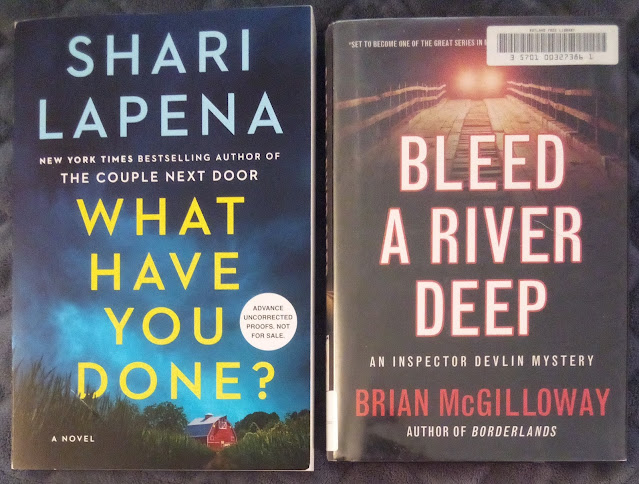Booked (and Printed): April 2024
|
Booked
(and Printed) April 2024 My April 2024 reading was a more varied affair than last
month’s. I read seven books—every one a novel or a story collection with not
a whiff of non-fiction anywhere in the mix. All seven of the books were
written by different writers. Four were by authors I had never read before: A
Hostile State, by Adrian Magson (2021), What Have You Done?, by Shari
Lapena (2024)—which I’m reviewing for Mystery Scene—Flamingo Road,
by Sasscer Hill (2017), and Bleed a River Deep, by Brian McGilloway
(2010). FLAMINGO ROAD, while it was an imperfect mystery, was my
favorite of April’s books simply because I enjoyed the company of its heroine,
Fia McKee, so much. I reviewed it here. Another of my favorites for the month is, BLEED A RIVER DEEP, which is McGilloway’s third Inspector Devlin mystery. It is a thoughtful and well-plotted Irish police procedural that has stayed in my mind since reading it. One book, JOURNEY, by
Catherine Arnold (2003), is interesting because, while it was self-published as
by Catherine Arnold—a pseudonym Theresa Sandberg-Arnston used for a quartet
of legal thrillers in the late-1990s—I believe it was written by Theresa’s
husband, Harrison Arnston, in the mid-1990s shortly before his death in 1996.
It is an X-Files-type UFO thriller with a cool ’90s vibe
and a fluid style that matches that of Arnston’s final few novels. Plus, in a
newspaper interview after Arnston’s death, Theresa mentioned she was
marketing a book of his titled Journey, but with little success. I
wrote more about this here. |
|
I read a couple individual short stories, one was a solid science
fiction tale—“THE GREAT SECRET,” by George H. Smith, in the Oct. 1959 issue
of Super-Science Fiction—and the other was a so-so mystery by the
usually dependable Jack Ritchie: “THE GHOST OF CLAUDIA MCKENNY” (EQMM,
May 1984). There were also two excellent science
fiction single author collections: THE CELESTIAL BLUEPRINT & OTHER STORIES, by Philip José Farmer (2024), and THE FITTEST & OTHER STORIES, by the incomparable Katherine MacLean (2024). The collections are
both filled with stories from the 1950s and ’60s. Farmer, as usual, is marvelous
for no other reason than his work was, and still is, edgy for its distrust of
authority and criticism of organized religion. You can read a little more about this collection, retitled to Heretic: Stories, here. And MacLean. She was, simply
put, a brilliant stylist and a keen extrapolator of the near-future. Fin— I wonder what I’ll read next
month? |
|
|




Comments
Post a Comment